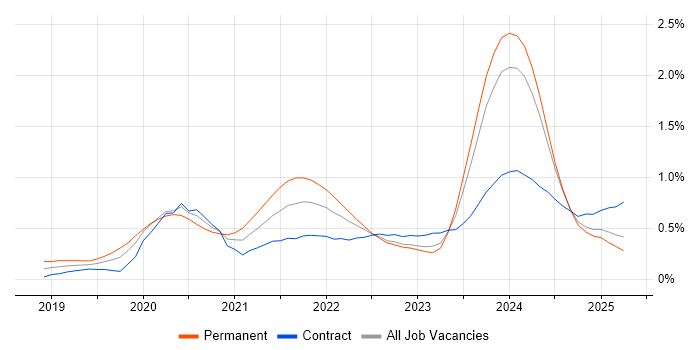Databricks
UK > Scotland
The table below provides summary statistics for permanent job vacancies advertised in Scotland requiring knowledge or experience of Databricks products and/or services. It includes a benchmarking guide to the annual salaries offered in vacancies that cited Databricks over the 6 months leading up to 1 May 2025, comparing them to the same period in the previous two years.
The figures below represent the IT labour market in general and are not representative of salaries within Databricks.
| 6 months to 1 May 2025 |
Same period 2024 | Same period 2023 | |
|---|---|---|---|
| Rank | 132 | 91 | 215 |
| Rank change year-on-year | -41 | +124 | -24 |
| Permanent jobs citing Databricks | 13 | 278 | 7 |
| As % of all permanent jobs advertised in Scotland | 0.46% | 4.13% | 0.15% |
| As % of the Vendors category | 1.70% | 12.37% | 0.42% |
| Number of salaries quoted | 7 | 8 | 6 |
| 10th Percentile | £72,500 | - | £53,750 |
| 25th Percentile | £73,125 | £59,750 | £55,000 |
| Median annual salary (50th Percentile) | £75,000 | £66,500 | £60,000 |
| Median % change year-on-year | +12.78% | +10.83% | +14.29% |
| 75th Percentile | £80,625 | £73,250 | £65,000 |
| 90th Percentile | £88,750 | £77,900 | £106,250 |
| UK median annual salary | £80,000 | £80,000 | £77,500 |
| % change year-on-year | - | +3.23% | +10.71% |
All Vendors
Scotland
Databricks falls under the Vendor Products and Services category. For comparison with the information above, the following table provides summary statistics for all permanent job vacancies requiring knowledge or experience of all vendor products and services in Scotland.
| Permanent vacancies with a requirement for knowledge or experience of vendor products and services | 765 | 2,248 | 1,663 |
| As % of all permanent jobs advertised in Scotland | 27.15% | 33.37% | 35.20% |
| Number of salaries quoted | 417 | 772 | 760 |
| 10th Percentile | £23,504 | £24,888 | £30,000 |
| 25th Percentile | £26,929 | £33,250 | £39,829 |
| Median annual salary (50th Percentile) | £45,000 | £50,000 | £55,000 |
| Median % change year-on-year | -10.00% | -9.09% | +12.63% |
| 75th Percentile | £66,250 | £63,750 | £73,875 |
| 90th Percentile | £85,000 | £80,000 | £85,000 |
| UK median annual salary | £55,000 | £50,000 | £57,500 |
| % change year-on-year | +10.00% | -13.04% | +4.55% |
Databricks
Job Vacancy Trend in Scotland
Job postings citing Databricks as a proportion of all IT jobs advertised in Scotland.

Databricks
Salary Trend in Scotland
3-month moving average salary quoted in jobs citing Databricks in Scotland.
Databricks
Salary Histogram in Scotland
Salary distribution for jobs citing Databricks in Scotland over the 6 months to 1 May 2025.
Databricks
Job Locations in Scotland
The table below looks at the demand and provides a guide to the median salaries quoted in IT jobs citing Databricks within the Scotland region over the 6 months to 1 May 2025. The 'Rank Change' column provides an indication of the change in demand within each location based on the same 6 month period last year.
| Location | Rank Change on Same Period Last Year |
Matching Permanent IT Job Ads |
Median Salary Past 6 Months |
Median Salary % Change on Same Period Last Year |
Live Jobs |
|---|---|---|---|---|---|
| Glasgow | +28 | 7 | £75,000 | +11.11% | 7 |
| Edinburgh | +22 | 7 | £77,500 | +19.23% | 12 |
| Aberdeen | - | 1 | - | - | 1 |
| Databricks UK |
|||||
Databricks
Co-occurring Skills and Capabilities in Scotland by Category
The follow tables expand on the table above by listing co-occurrences grouped by category. The same employment type, locality and period is covered with up to 20 co-occurrences shown in each of the following categories:
